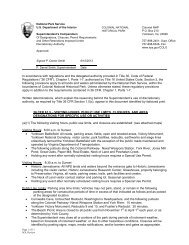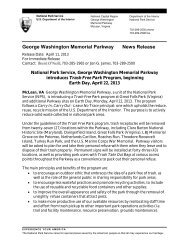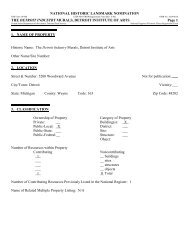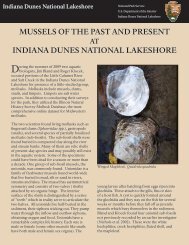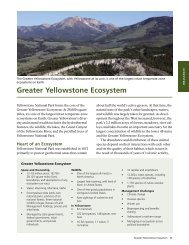- Page 1 and 2: National Park Service U.S. Departme
- Page 3: Vanderbilt Mansion, 1898. Wurts Bro
- Page 6 and 7: Cover illustration: Vanderbilt Mans
- Page 8 and 9: Gardens and Greenhouses............
- Page 10 and 11: Transportation, Power, and Mechanic
- Page 13 and 14: Illustrations begin on p. 273. LIST
- Page 15: LIST OF DIAGRAMS 1. The Management
- Page 19 and 20: PREFACE When the Vanderbilt Mansion
- Page 21: properties in their assessments. Wh
- Page 25 and 26: EXECUTIVE SUMMARY The Historic Reso
- Page 27: gardens. The site represents the ru
- Page 30 and 31: many new plantings. The farm side o
- Page 32 and 33: The Gilded Age and Country Places A
- Page 36 and 37: The Gilded Age and Country Places a
- Page 38 and 39: The Gilded Age and Country Places S
- Page 40 and 41: The Gilded Age and Country Places s
- Page 42 and 43: The Gilded Age and Country Places J
- Page 44 and 45: The Gilded Age and Country Places T
- Page 46 and 47: The Gilded Age and Country Places u
- Page 48 and 49: The Gilded Age and Country Places G
- Page 50 and 51: The Gilded Age and Country Places i
- Page 52 and 53: The Gilded Age and Country Places s
- Page 54 and 55: The Gilded Age and Country Places T
- Page 56 and 57: The Gilded Age and Country Places t
- Page 58 and 59: The Gilded Age and Country Places d
- Page 60 and 61: The Gilded Age and Country Places r
- Page 62 and 63: The Gilded Age and Country Places r
- Page 64 and 65: The Gilded Age and Country Places N
- Page 66 and 67: The Gilded Age and Country Places a
- Page 68 and 69: The Gilded Age and Country Places P
- Page 70 and 71: The Gilded Age and Country Places t
- Page 73 and 74: CHAPTER TWO HISTORICAL OVERVIEW EVO
- Page 75 and 76: Historical Overview ownership, whil
- Page 77 and 78: Historical Overview horses. . . ."
- Page 79 and 80: Historical Overview Frederick's kno
- Page 81 and 82: Historical Overview According to Cl
- Page 83 and 84: Historical Overview their expense.
- Page 85 and 86:
Historical Overview From 1885 to 19
- Page 87 and 88:
Historical Overview and entertainme
- Page 89 and 90:
Historical Overview death, the Vede
- Page 91 and 92:
Historical Overview office handling
- Page 93 and 94:
Historical Overview MANAGING THE ES
- Page 95 and 96:
Historical Overview Mr. Burnett suc
- Page 97 and 98:
Historical Overview the boarders as
- Page 99 and 100:
Poultry house Historical Overview T
- Page 101 and 102:
Historical Overview After cutting t
- Page 103 and 104:
Valet and 2nd Man 3 rd Man Secretar
- Page 105 and 106:
Historical Overview The butler and
- Page 107 and 108:
Kitchen Maid Historical Overview In
- Page 109 and 110:
Valet Historical Overview The secon
- Page 111 and 112:
Historical Overview each employee."
- Page 113 and 114:
Historical Overview his boathouse t
- Page 115:
Historical Overview Shortly thereaf
- Page 118 and 119:
Resource History and Description of
- Page 120 and 121:
Resource History and Description of
- Page 122 and 123:
Resource History and Description of
- Page 124 and 125:
Resource History and Description of
- Page 126 and 127:
Resource History and Description of
- Page 128 and 129:
Resource History and Description of
- Page 130 and 131:
Resource History and Description of
- Page 132 and 133:
Resource History and Description of
- Page 134 and 135:
Resource History and Description of
- Page 136 and 137:
Resource History and Description of
- Page 138 and 139:
Resource History and Description of
- Page 140 and 141:
Resource History and Description of
- Page 142 and 143:
Resource History and Description of
- Page 144 and 145:
Resource History and Description of
- Page 146 and 147:
Resource History and Description of
- Page 148 and 149:
Resource History and Description of
- Page 150 and 151:
Resource History and Description of
- Page 152 and 153:
Resource History and Description of
- Page 154 and 155:
Resource History and Description of
- Page 156 and 157:
Resource History and Description of
- Page 158 and 159:
Resource History and Description of
- Page 160 and 161:
Resource History and Description of
- Page 162 and 163:
Resource History and Description of
- Page 164 and 165:
Resource History and Description of
- Page 166 and 167:
Resource History and Description of
- Page 168 and 169:
Resource History and Description of
- Page 170 and 171:
Resource History and Description of
- Page 172 and 173:
Resource History and Description of
- Page 174 and 175:
Resource History and Description of
- Page 176 and 177:
Resource History and Description of
- Page 178 and 179:
THIRD FLOOR Resource History and De
- Page 180 and 181:
Pink Bedroom Resource History and D
- Page 182 and 183:
Empire Bedroom Resource History and
- Page 184 and 185:
Resource History and Description of
- Page 186 and 187:
Resource History and Description of
- Page 188 and 189:
Resource History and Description of
- Page 190 and 191:
Dumbwaiter Resource History and Des
- Page 192 and 193:
Resource History and Description of
- Page 194 and 195:
Service Laundry Resource History an
- Page 196 and 197:
Resource History and Description of
- Page 198 and 199:
FIRST FLOOR BUTLERS' PANTRY Resourc
- Page 200 and 201:
Resource History and Description of
- Page 202 and 203:
Resource History and Description of
- Page 204 and 205:
Resource History and Description of
- Page 206 and 207:
Resource History and Description of
- Page 208 and 209:
Resource History and Description of
- Page 210 and 211:
Resource History and Description of
- Page 212 and 213:
Resource History and Description of
- Page 214 and 215:
Resource History and Description of
- Page 216 and 217:
Resource History and Description of
- Page 218 and 219:
Resource History and Description of
- Page 220 and 221:
Resource History and Description of
- Page 222 and 223:
Resource History and Description of
- Page 224 and 225:
Resource History and Description of
- Page 226 and 227:
Resource History and Description of
- Page 228 and 229:
Resource History and Description of
- Page 230 and 231:
Resource History and Description of
- Page 232 and 233:
Resource History and Description of
- Page 234 and 235:
Resource History and Description of
- Page 236 and 237:
Resource History and Description of
- Page 238 and 239:
Resource History and Description of
- Page 240 and 241:
Resource History and Description of
- Page 242 and 243:
HEATING AND VENTILATION Resource Hi
- Page 244 and 245:
Resource History and Description of
- Page 246 and 247:
Resource History and Description of
- Page 248 and 249:
Resource History and Description of
- Page 250 and 251:
Resource History and Description of
- Page 252 and 253:
Resource History and Description of
- Page 255 and 256:
CHAPTER FOUR ANALYSIS OF HISTORICAL
- Page 257 and 258:
Analysis of Historical Significance
- Page 259 and 260:
Analysis of Historical Significance
- Page 261 and 262:
Analysis of Historical Significance
- Page 263 and 264:
Analysis of Historical Significance
- Page 265 and 266:
Analysis of Historical Significance
- Page 267 and 268:
Analysis of Historical Significance
- Page 269 and 270:
Analysis of Historical Significance
- Page 271 and 272:
Analysis of Historical Significance
- Page 273 and 274:
Analysis of Historical Significance
- Page 275 and 276:
Analysis of Historical Significance
- Page 277 and 278:
Analysis of Historical Significance
- Page 279 and 280:
Analysis of Historical Significance
- Page 281 and 282:
Analysis of Historical Significance
- Page 283 and 284:
Date/Style 1879, adds. thru 1890s/
- Page 285 and 286:
Analysis of Historical Significance
- Page 287 and 288:
Analysis of Historical Significance
- Page 289 and 290:
Analysis of Historical Significance
- Page 291 and 292:
Analysis of Historical Significance
- Page 293 and 294:
WATER SYSTEM Analysis of Historical
- Page 295 and 296:
CHAPTER FIVE ANALYSIS OF HISTORIC S
- Page 297 and 298:
Analysis of Historic Significance a
- Page 299:
Analysis of Historic Significance a
- Page 303:
ILLUSTRATIONS
- Page 306 and 307:
276 Figure 2. Vanderbilt Mansion, S
- Page 308 and 309:
278 Figure 4. Vanderbilt Mansion, W
- Page 310 and 311:
280 Figure 6. Vanderbilt Mansion, B
- Page 312 and 313:
282 Figure 8. Vanderbilt Mansion, S
- Page 314 and 315:
284 Figure 10. Vanderbilt Mansion,
- Page 316 and 317:
286 Figure 12. Vanderbilt Mansion,
- Page 318 and 319:
Figure 14. Vanderbilt Mansion, 1898
- Page 320 and 321:
290 Figure 16. The Vanderbilt Mansi
- Page 322 and 323:
292 Figure 18. The Vanderbilt Mansi
- Page 324 and 325:
Figure 20. Stone Crusher. The stone
- Page 327:
APPENDICES
- Page 330 and 331:
p.57 Nov. 7, 1896 Volume 6 On House
- Page 332 and 333:
p.231 August 12, 1897 On House at H
- Page 334 and 335:
p.388 July 13, 1898 On House, Lodge
- Page 336 and 337:
Herter Brothers Dining Room 3,000.0
- Page 338 and 339:
308
- Page 340 and 341:
him explicit instructions on what h
- Page 342 and 343:
them as sub-contractors. 1451 Among
- Page 344 and 345:
From the mid 1880s to the mid 1890s
- Page 346 and 347:
316
- Page 348 and 349:
South Foyer Rug 6.5' x 16.2' Living
- Page 350 and 351:
Mrs. Vanderbilt's Boudoir Pair of M
- Page 352 and 353:
Third Floor Stairway 2 desk lamps a
- Page 355 and 356:
APPENDIX 4 CHRONOLOGY OF LANDSCAPE
- Page 357 and 358:
APPENDIX 5 JAMES L. GREENLEAF BIOGR
- Page 359 and 360:
APPENDIX 6 THE HYDE PARK LANDSCAPE
- Page 361:
Vitale and Geiffert, Ferruccio Vita
- Page 364 and 365:
158 cu. yds. 3/4" stone June 25, 18
- Page 366 and 367:
November 8, 1899 Wm. A. Caire: pipe
- Page 368 and 369:
may be significant in their own rig
- Page 370 and 371:
Comments Character-defining Feature
- Page 372 and 373:
Comments Character-Defining Feature
- Page 374 and 375:
Character-Defining Features of Indi
- Page 376 and 377:
Comments Character-Defining Feature
- Page 378 and 379:
Character-Defining Features of Indi
- Page 380 and 381:
Character-Defining Features of Indi
- Page 382 and 383:
Character-Defining Features of Indi
- Page 384 and 385:
Character-Defining Features of Indi
- Page 386 and 387:
Character-Defining Features of Indi
- Page 388 and 389:
Comments Character-Defining Feature
- Page 390 and 391:
Character-Defining Features of Indi
- Page 392 and 393:
Character-Defining Features of Indi
- Page 394 and 395:
Character-Defining Features of Indi
- Page 396 and 397:
Character-Defining Features of Indi
- Page 398 and 399:
Character-Defining Features of Indi
- Page 400 and 401:
Character-Defining Features of Indi
- Page 402 and 403:
Comments Character-Defining Feature
- Page 404 and 405:
Character-Defining Features of Indi
- Page 406 and 407:
Character-Defining Features of Indi
- Page 408 and 409:
Character-Defining Features of Indi
- Page 410 and 411:
Character-Defining Features of Indi
- Page 412 and 413:
Character-Defining Features of Indi
- Page 414 and 415:
Character-Defining Features of Indi
- Page 416 and 417:
Comments Character-Defining Feature
- Page 418 and 419:
Character-Defining Features of Indi
- Page 420 and 421:
Character-Defining Features of Indi
- Page 422 and 423:
Character-Defining Features of Indi
- Page 424 and 425:
Character-Defining Features of Indi
- Page 426 and 427:
Character-Defining Features of Indi
- Page 428 and 429:
Comments Character-Defining Feature
- Page 430 and 431:
feed grown on the adjacent estate f
- Page 432 and 433:
Circulation Bard Rock Road Road has
- Page 434 and 435:
Lower Gate House Designed by the fi
- Page 436 and 437:
dry-laid stone retaining walls. Wal
- Page 438 and 439:
half-circle in plan, rubble filled
- Page 440 and 441:
Landscape Characteristics of the Hy
- Page 442 and 443:
Landscape Characteristics of the Hy
- Page 444 and 445:
Landscape Characteristics of the Hy
- Page 447 and 448:
GLOSSARY OF ARCHITECTURAL TERMS Thi
- Page 449 and 450:
"Châteauesque buildings, always of
- Page 451 and 452:
not only in the 1860s, but also the
- Page 453 and 454:
argeboards, hood molding over windo
- Page 455 and 456:
Louis XVI Style - The nineteenth ce
- Page 457 and 458:
their ridges meeting at right angle
- Page 459 and 460:
"Rustic Work - Decoration by means
- Page 461:
"That of the reign of Queen Victori
- Page 464 and 465:
BUSINESS LIFE OF FREDERICK VANDERBI
- Page 466 and 467:
EDWARD WALES Ruth Wales (daughter)
- Page 468 and 469:
HYDE PARK HISTORICAL SOCIETY The co
- Page 470 and 471:
VASSAR COLLEGE LIBRARY, SPECIAL COL
- Page 472 and 473:
Andrews, Wayne. The Vanderbilt Lege
- Page 474 and 475:
Granger, Alfred Hoyt. Charles Folle
- Page 476 and 477:
O'Brien, Raymond. J. American Subli
- Page 478 and 479:
ARTICLES AND PAMPHLETS "American Pl
- Page 480 and 481:
Metcalf, Pauline. "The Interiors of
- Page 482 and 483:
REPORTS Albee, Peggy A. Home of Fra
- Page 484 and 485:
_____. Historic Structure and Groun
- Page 486 and 487:
_____. Untitled journal. 1904. Tran







